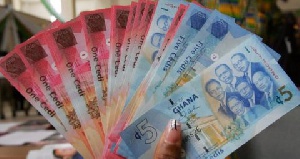When Europe's financial system was on the brink of crashing and taking the common monetary union with it, the emerging world seemed on a more secure footing. It had better debt levels, a demographic advantage and exposure to China's seemingly insatiable appetite for commodities.
For the past four years, the economic fog that covered Europe has helped obscure the cracks in emerging market economies.
But markets are always on the prowl for a new story and after the European Central Bank assured everyone that it would do all in its power to protect the euro, anxiety levels over Europe started to dissipate.
The fog started clearing and the cracks in other parts of the world became noticeable.
SA's tale of woe is known by every investor with emerging market exposure; it's a well-documented story.
But as fast as positive sentiment began returning to the UK, the fog over other African stories started clearing as well.
The story that has caught most attention for now is Ghana, though Nigeria and Zambia run pretty close.
It is extraordinary how the Ghanaian promise has unravelled in a matter of a few weeks.
The clearest evidence of the fallout is its bond performance. The yield on the country's benchmark US$1bn bond due in August 2023 shot up over 9,8% at the end of February, before cooling as the anti-emerging markets story took a breather. But it's been on the rise again.
Excited by the high levels of growth over the past decade, Ghana had gone on something of a borrowing binge in the hope that expansion would continue unabated in years to come.
If it had been borrowing to focus on expanding its infrastructure, the inherent risk would have been offset by the prospect of future growth.
However, Ghana had not invested nearly enough in bricks and mortar, but spent on higher wages for its public servants instead. They now make up about 70% of the national budget. Large wage adjustments occurred in 2012, the year of its presidential elections, and were underpinned by its discovery of oil in 2007 and its first export of it three years later.
The oil dividend hasn't delivered; revenues haven't met targets, with the price of oil rising only 8,3% over the past 12 months. Production of gold - the country is the continent's second-biggest producer - has dropped in line with the precious metal's 14,3% decline over the same period.
Ghana's growth is slowing, inflation is in double-digit territory - meaning those handsomely rewarded public servants are only going to want more - and if growth doesn't return to above 6% levels, and soon, investors are going to demand even more for their exposure. The country is not at full-blown crisis levels, but it's certainly at a crossroads.
Both ratings agencies Standard & Poor's and Moody's hold a "negative" outlook on the West African country.
Zambia, which remains a copper-dependent economy close to 100 years after it was first profitably mined, is in the same boat. China, the main source of its demand, is awash with the metal, and poor growth markers in the world's second-biggest economy have made the copper price plunge over 12% this year.
For most African countries, including SA, the problems could prove short term, and really are unavoidable, given the normalisation Ron Derby profile of monetary policy in developed economies.
But it's dependent on the right fiscal policies, and by that I mean the correct political decisions. Given how political contests are played out across the continent, and, to be fair, in most of the world (developed included), it's going to prove difficult to make the tough choices.
That's of course unless an economic cycle with the prefix "super" returns, and soon.
[This article was originally published under the headline "Africa's turn for exposure" by the Financial Times]
Business News of Wednesday, 26 March 2014
Source: Financial Mail

















